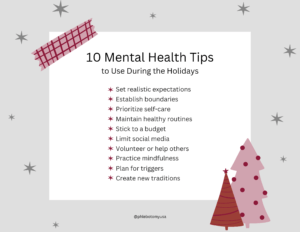23 Dec 10 Tips for Mental Well-Being During the Holidays
The holiday season, meant to be a time of joy and celebration, can also be a period of stress and emotional struggle for many. Studies show that 64 percent of individuals living with a mental illness reported that their conditions worsened around the holidays.
Factors such as social isolation, family dynamics, financial pressures, and the disruption of regular routines can contribute to heightened levels of anxiety, depression, and stress. These holiday mental health tips can guide you through the season and help you maintain emotional balance and mental well-being.
Understanding the Holiday Blues
The holiday blues affect many people each year. While some enjoy the holidays, others feel lonely, sad, or stressed. The gap between expectations and reality can make these emotions worse, especially if you’re dealing with loss, financial issues, or family problems.
The pressure to join in constant celebrations can make it hard to focus on yourself. Remember, the holiday blues are temporary and your feelings are valid. Recognizing this is the first step in managing your mental health.
Recognizing the Signs and Symptoms of Holiday Blues
Holiday stress and depression can show up emotionally and physically. You may feel sad, tired, frustrated, or lonely, even when surrounded by others. Other signs include tension, feeling dissatisfied, or hopelessness.
Physical symptoms may include changes in appetite, trouble sleeping, or low energy. The holidays can also bring up painful memories or highlight losses. Recognizing these signs early can help you take steps to protect your mental health.
Your Feelings Are Valid
First and foremost, it’s essential to acknowledge that it’s completely normal to feel a range of emotions during the holidays, and not all of them are festive or joyful. Society often pressures individuals to feel happy and participate in celebrations, but the reality is more complex.
Personal circumstances such as grieving a loved one, dealing with family conflicts, or feeling the weight of societal expectations can make the holidays a challenging time. Remember, it’s okay to feel different from the holiday cheer around you.
10 Holiday Mental Health Tips & Wellness Strategies
Set Realistic Expectations
Acknowledge that the holidays don’t have to be perfect. It’s normal for plans to change or not meet idealistic standards set by society or even ourselves. In contrast, focus on what truly matters and be gentle with yourself during stressful or disappointing moments.
Consider revisiting past experiences and setting boundaries that allow for a more relaxed and enjoyable holiday season. Redefining what the holidays mean to you can lead to more fulfilling and less stressful celebrations.
Establish Boundaries
It’s important to communicate your limits to family and friends. This might mean limiting your time at social events, choosing not to engage in certain conversations, or prioritizing your own needs. Connecting with a support system can benefit your mental health, but only if it’s on mutually respectful and healthy terms. Remember, saying no is a form of self-care.
Prioritize Self-Care
Dedicate time to activities that rejuvenate and relax you. Whether indulging in a hobby or enjoying a quiet evening, these moments can significantly improve your mental state and resilience. Reading a favorite book, taking a long walk, or doing yoga are also great options.
Maintain Healthy Routines
Try to stick to your regular daily routines as much as possible. Consistent sleep patterns, nutritious eating, and regular physical activity can significantly impact your mental and emotional health and provide stability amidst the holiday chaos.
The holidays can disrupt your normal routines and lead to increased stress and fatigue. By maintaining healthy habits, you create a foundation that supports your overall well-being to help you manage the season with greater ease.
Stick to a Budget
Financial stress can be a major source of anxiety during the holidays. Create a budget that works for you and keep it. Focus on meaningful experiences over materialistic gifts. Remember, the price of gifts doesn’t measure the value of the holiday season.
Limit Social Media
Social media can often present an unrealistic picture of holiday perfection. Therefore, limiting your exposure can reduce feelings of inadequacy or loneliness. Remember, what’s often portrayed online is a curated highlight reel, not the full picture.
Volunteer or Help Others
Helping others can provide a sense of purpose and fulfillment. Consider volunteering at local shelters or community centers. Acts of kindness, big or small, can lift your spirits and strengthen community connections.
Practice Mindfulness and Gratitude
Engage in mindfulness practices to stay present and reduce stress. Reflecting on what you are grateful for can also shift your focus from what you feel you’re missing to what you do have to create a sense of contentment and peace.
Plan for Triggers
If you know certain situations or interactions are likely to cause stress, plan how to handle them. For example, rehearse responses, set visit time limits, or have a supportive friend on call for a quick escape or debrief.
Create New Traditions
If existing holiday traditions bring up negative emotions, don’t be afraid to create new ones. This could be anything that brings you peace and joy. New traditions can reflect your current interests and values, making the holidays more personal and enjoyable.
This holiday season, prioritize your mental health just as you would your physical health. Recognize that it’s perfectly normal to experience a wide range of emotions during this time. At Phlebotomy Training Specialists, we understand the importance of mental health, especially during the holiday season.
As you focus on caring for others, whether through our phlebotomy training programs or in your personal life, remember to also care for yourself. Mental well-being is essential for success in any field, and we’re here to support you every step of the way. Together, let’s make this holiday season a time of growth, self-care, and professional achievement.
Embrace self-compassion, seek support when needed, and remember that taking care of your mental well-being is the most important gift you can give yourself.


